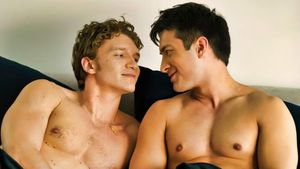"Did you know he's Filipino?"
I was always embarrassed by that phrase. Every time there was even a rumor that someone might have a Filipino background, my family would make a huge deal about it. I didn't understand. We were American. I didn't want my accomplishments to be acknowledged because a Filipino did it. It should be because it was noteworthy in and of itself. I struggled with the pride my family had in its heritage and wondered, Why is it such a big deal?
Watching Conan the Barbarian, I suddenly understood. On the big screen was a kid who looked just like me. Ernie Reyes Jr.'s character was smart, capable, and instrumental to the plot. While he was everything I wanted to be, he was not the hero. Similarly, when the legendary Bruce Lee was cast as Kato in The Green Hornet in the 1960s, it continued a precedent of the heroic European protagonist and their faithful, and in many cases more capable, non-European companion. From Jonny Quest and Hadji to Indiana Jones and Roundhouse to as recently as Doctor Strange and Wong and even Peter Parker and Ned Leeds, it is a paradigm that has been repeated over and over again.
Being included is great. But at a certain point you want to be more than an accessory.
Representation matters; it's not simply about inclusion.
Being Filipino meant I was devalued, but being gay meant that I was reviled. Games like "Smear the Queer" and the casual usage of "homo" and "f****t" defined growing up gay. One of my friends left class early every day to run to the train station to avoid being chased and beaten up. Another friend walked against the lockers to avoid frequent "accidental" stabs from a compass. Another quit the football team after constant harassment dismissed as "just boys playing around." The final straw was when he found his locker taped shut and covered with dirty jockstraps and urine.
In our hearts we knew we were all right. But our peers were offered no alternatives to their pernicious narratives about us. So in their minds, we deserved their violence.
Some might believe that being LGBT isn't a problem anymore. We have been included in everything from policy t0 citywide celebrations to music, television, and even some cartoons. Though it seems the stigma has been lifted, the numbers tell a different story. The National School Climate Survey (2013) reports 74 percent of LGBT students bullied for sexual orientation, 55 percent for gender expression, and 36 percent experiencing physical harassment and violence. While visibility of LGBT people has increased, the marginalization has remained the same.
The problem here is not in the inclusion but in the representation.
In 2011 the FAIR Education Act, authored by state Sen. Mark Leno, was passed in California. It revised the education code, requiring that all schools that receive public funding adopt books and materials that had fair representations of Asian-Pacific Islanders, LGBT people, and people with disabilities. Our Family Coalition convened the FAIR Education Act Implementation Coalition, gathering together multiple LGBT advocacy organizations along with the Committee on LGBT History. Together we helped develop the History and Social-Science Framework, the standard texts must meet to be accepted as curriculum in California. It was adopted in 2016, and we thought the hardest part of the battle for representation had passed.
When the drafts for the textbooks were released, however, we found that there was no substantial inclusion of us. The representative history we had fought so hard for was now in danger of being erased. Again.
I thought of my family grasping for any semblance of a sign of our heritage to justify our worth, feeling like I was going through all of it again. I thought of our children and how they might come to learn that their uncle's only value was as a punch line or a punching bag.
The coalition went to Sacramento in July, and August, and now again in September. We will go again in November if we have to. No one should grow up learning that their family doesn't count or that their neighbors are worth less than them.
My personal hope is that my niece, Zelda, will be able to ask, "Why was it such a big deal? Of course all of us should be included in history. We all belong."
RICK OCULTO is the education manager for Our Family Coalition.




































































Charlie Kirk DID say stoning gay people was the 'perfect law' — and these other heinous quotes